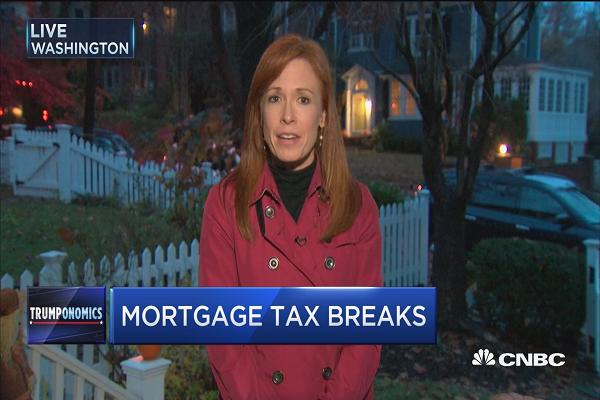For more than a century, homeownership has come with a small bonus: The mortgage interest deduction.
It allows borrowers to deduct the interest paid on their home loans from their income taxes. Real estate agents, homebuilders and mortgage lenders have long used it as a selling point. Every so often it comes up in debate, but it is so popular that lawmakers are more than a little bit afraid to touch it. The future Trump administration apparently is not.
“We’ll cap the mortgage interest, but we’ll allow some deductibility,” said Steve Mnuchin on CNBC Wednesday after confirming that has been asked by President-elect Donald Trump to head the Treasury Department.
The mortgage interest deduction is already capped at loans up to $1 million if you’re married and filing jointly, and at $500,000 if you file separately. That said, the median price of a home in the United States is just more than $200,000, so not a lot of people make it to that cap. The vast majority of those who do benefit earn more than $100,000 a year and are not the most cost-burdened homeowners.
The deduction is very popular, but it benefits far fewer taxpayers than one might think. The current homeownership rate is around 62 percent, but of those homeowners, one-third do not have a mortgage. They own their homes outright, so the deduction would not apply to them.
Some homeowners, mainly middle- and lower-income families either don’t pay federal income taxes or don’t itemize, so the deduction wouldn’t apply to them either. Only about 40 million (or 22.5 percent) of the 173 million households in the U.S. benefit from the mortgage interest deduction, according to the Tax Policy Center.
For those who do itemize, here’s how the math works: Let’s say you have a $500,000 30-year-fixed mortgage at 4.5 percent, and you’re in the 33 percent tax bracket. In the first year of your loan, the deduction saves you just more than $10,000 in taxes.
If the Trump administration caps deductions at even $100,000, as Mnuchin suggested, that would not hit most borrowers because on that $500,000 (which is more than most loans in general) the total annual interest payment was about $23,000. Granted, homeowners may have other deductions, medical expenses, charitable, religious or otherwise, but most would not make it to $100,000 even with the mortgage.
Despite the small number of borrowers a cap would affect, real estate industry leaders oppose any changes, especially in an environment where they are trying to convince young millennials that a home is a good investment.
Millennials lived through the recession and the housing crash and saw what the crisis did to their parents’ savings. First-time buyers have been the missing link in the housing recovery, already cash strapped by low wages and high levels of student debt.
“We would strongly oppose any attempt to limit or eliminate the mortgage interest deduction. Realtors know that the MID is an important benefit not just for the millions of current homeowners who depend on it, but also for renters looking to make the transition into homeownership,” said William E. Brown, president of the National Association of Realtors.
“We’re living in a time of tight credit and low inventory, with homeownership rates hovering around a 50-year low. Doing anything that would make it harder for buyers to enter the market is a fundamental step in the wrong direction.”
Mortgage interest rates have been rising dramatically since the election in November, and that has already slowed demand among some homebuyers. Home prices also just crossed over to record highs in September, according to the S&P CoreLogic Case-Shiller Home Price Index.
Affordability is weakening, and while some claim that job and income growth will make up for it in 2017, the prospect of losing the deduction, meaningful or not, is another emotional barrier to entry for potential homebuyers on the edge of ownership.
source”cnbc”






